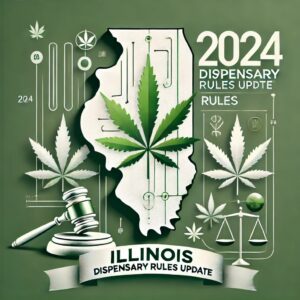This page provides a comprehensive guide, focusing on How to Open a Dispensary in Georgia. It addresses the legal and regulatory landscape, including recent updates, and explores potential future developments.
Historical Context of Cannabis in Georgia
Cannabis has a complex historical context in Georgia. Currently, recreational cannabis use and possession are illegal throughout the state. However, there have been efforts to legalize recreational cannabis through proposed bills, though none have passed so far.
In 2019, Georgia passed the Hope Act, which allows patients with qualifying conditions to access low-THC oil. However, the rollout of the medical marijuana program has faced challenges and delays due to legal issues and licensing problems.
As of now, there are only two operational dispensaries in Georgia that sell low-THC oil to registered patients.
Overview of State Regulations
Navigating Georgia’s cannabis regulations requires a keen understanding of both legislative intent and administrative detail.
Even with a slow rollout, Georgia’s medical marijuana program signals a shift in legislative perspectives.
As legal frameworks evolve, potential licensees must stay abreast of not only legislative changes but also the nuances of compliance, reporting obligations, and deadlines.
With patient access largely limited, the success of Georgia’s cannabis program hinges on the precise execution of regulatory mandates and the eventual expansion of licensing opportunities.
Decoding Medical Marijuana Legislation
Georgia’s Hope Act represents a cautious yet significant step toward medical cannabis acceptance within the state. Despite operational hindrances, it lays the groundwork for legitimate medical access under stringent regulations.
The Act’s provision for low-THC oil underlines a conservative approach to cannabis. Defined qualifying conditions limit eligibility, reflecting the state’s careful advancement.
Indeed, Georgia’s medical marijuana framework is notably restrictive, offering access only to non-euphoric preparations (less than 5% THC) for registered patients.
The legal intricacies of the Hope Act demand thorough adherence to guidelines, which may be onerous for patients and providers alike, necessitating clear comprehension and precision.
Failure to comply with the Act’s caveats can lead to severe penalties, underscoring the need for vigilant compliance and proactive legal support for those navigating this space.
For early entrants, understanding Georgia’s cautious stance on medical marijuana is paramount. Knowledge of legislative nuances ensures adherence to the regulatory framework and positions stakeholders for success in a budding industry.
Current Status of the Cannabis Industry in Georgia
The cannabis industry in Georgia remains tightly regulated and nascent. Currently, only medical cannabis in the form of low-THC oil is legal.
Recreational cannabis remains prohibited under state law. No framework exists for legal sales or possession.
Medical cannabis access is confined to patients with qualifying conditions and is bound by the rigors of the Hope Act. Dispensing licenses have yet to be established, compounding accessibility issues.
Stakeholders and interested parties must navigate a complex legal landscape. The industry’s future hinges on potential legislative changes and the implementation of a more robust medical cannabis infrastructure. Compliance with existing laws is critical for all involved.
Business Opportunities
Notwithstanding the stringent controls, prospects in Georgia’s medical cannabis sector exist. With only two dispensaries operational, demand invariably outstrips supply.
Entrepreneurs and investors should observe Georgia’s regulatory environment closely. Anticipate the potential expansion of licensing opportunities as demand for medical cannabis continues to grow.
While the licensing process is on hold, preparation is advisable. Prospective proprietors can establish a foundational understanding of regulatory requirements, fostering readiness for when the state progresses.
Types of Cannabis Licenses in Georgia
In the State of Georgia, specific licensure is mandated for cannabis cultivation, production, and dispensing. Currently, there exist two categories for production licenses, namely Class 1 and Class 2.
-
Class 1 Production License allows for large-scale operations. A finite number of these permits have been issued.
-
Class 2 Production License is designed for smaller ventures. The number of issued licenses is also limited.
-
For dispensing, Georgia will offer a dispensing license, though the specifics of the application process remain undisclosed. Meticulous observance of the regulatory developments regarding these licenses is essential for compliance and successful entry into the market.
Despite the absence of recreational use cannabis licenses, Georgia’s evolving cannabis landscape suggests the possibility of future categories, pending legislation. The market’s framework is nascent, with the potential to mature over time.
Application Process for a Dispensary License in Delaware
Before embarking on the application process for a dispensary license in Georgia, it is imperative to establish a comprehensive understanding of state-specific regulations and compliance requirements. Candidates must anticipate stringent scrutiny of their background, financial stability, and operational plans as they navigate this complex vetting procedure.
A successful application hinges on a meticulously crafted business plan coupled with robust evidence of compliance with Georgia’s regulatory framework. Attention to detail and strategic alignment with state mandates can elevate the prospects of licensure approval.
Application and License Fees
Understanding the fee structure for dispensary licenses in Georgia is critical for financial planning.
-
Initial Application Fee: A non-refundable fee is required when applying. The exact amount will be determined by the Georgia Access to Medical Cannabis Commission.
-
License Fee: Upon approval, a substantial license fee is due for the issuance of the dispensary license. This fee may vary between Class 1 and Class 2 licenses.
-
Renewal Fee: Dispensaries must pay a renewal fee periodically to maintain their license. The frequency and amount are subject to commission guidelines.
Given the variance in fee schedules, it’s essential to remain informed about updates from the Georgia Access to Medical Cannabis Commission.
Meeting Compliance and Legal Requirements
Achieving compliance is pivotal for dispensary operations in the State of Georgia.
-
Understand the Regulatory Framework: Start by comprehensively understanding the Georgia Hope Act and its implications for dispensary operations.
-
Secure Proper Zoning Approval: Engage with local authorities to ensure the location of your dispensary meets all zoning requirements.
-
Develop a Compliance Plan: Implement standard operating procedures (SOPs) that adhere strictly to state laws and regulations regarding cannabis handling and sales.
-
Complete State License Applications: Prepare and submit all required documents and fees for licensing as stipulated by the Georgia Access to Medical Cannabis Commission.
-
Attain Local Business Licenses: In addition to state licenses, secure all necessary local business licenses.
-
Implement Patient Verification Systems: Set up systems to verify the eligibility and registration of patients in accordance to state mandates.
-
Maintain Ongoing Compliance: Stay current with evolving cannabis laws and adjust your business practices accordingly to maintain legal operational status.Alignment with Georgia’s regulatory requirements is non-negotiable.
Compliance ensures the integrity of your dispensary and protects against legal ramifications.
Establishing Your Dispensary Business
Embarking on the journey to open a dispensary in Georgia demands rigorous research and meticulous planning. Such forethought ensures adherence to complex regulatory frameworks and industry best practices, setting a foundation for compliance and operational resilience.
Given the evolving nature of cannabis legislation and market dynamics, prospective dispensary owners must remain vigilant and informed. Engaging with legal counsel specializing in cannabis law is imperative to navigate the intricacies of licensure, negotiate contracts, and mitigate potential legal challenges.
A successful dispensary also hinges on an underpinning of robust financial planning and management. Securing adequate funding and managing cash flow are critical to enduring the often lengthy process from licensing to launch and beyond.
Crafting a Solid Business Plan
A comprehensive business plan is crucial for navigating the complexities of opening a dispensary in Georgia.
-
Executive Summary: Start with a clear and compelling overview of your business goals and strategy.
-
Market Research: Detail an analysis of the local market, customer demographics, and competitive landscape.
-
Organizational Structure: Define your business’s legal structure, management team, and staffing requirements.
-
Product Line: Describe the types of cannabis products and strains you intend to carry, considering Georgia’s regulations on low-THC oil.
-
Marketing Plan: Develop strategies for brand positioning, advertising, and patient outreach that comply with state cannabis marketing regulations.
-
Financial Projections: Present detailed revenue projections, start-up costs, operating expenses, and profitability forecasts.
-
Risk Analysis: Identify potential risks and your strategic plans for risk mitigation, including legal and market considerations.
-
Licensing Requirements: Include a section dedicated to addressing how you will meet Georgia’s specific cannabis dispensary licensing criteria.
-
Sustainability Measures: Outline environmentally sustainable practices and community engagement plans to enhance your dispensary’s image.Your business plan must reflect a realistic path to profitability and adherence to Georgia’s cannabis regulations.
It should also serve as a roadmap for guiding your dispensary to successful establishment and growth in the market.
Securing Location and Financing
Select an appropriate property. Securing a location for your dispensary is inherently nuanced. You must select a site that conforms to Georgia’s zoning requirements for medical cannabis businesses, ensuring it is the required distance from schools and churches. Additionally, the chosen site must be accessible and inviting to create a positive patient experience.
Evaluate all financing options. You will face considerable startup costs – from securing the location to stocking inventory. Traditional financing routes may be difficult due to the federal classification of cannabis, hence consider alternative funding options like investor capital, cannabis-specific lenders, or crowdfunding initiatives.
Secure sufficient capital to sustain the operation.
With the long lead time to profitability in the cannabis industry, sustaining operating costs is paramount. Securing sufficient funding, whether through loans, investments, or reserves, will be essential until dispensary operations stabilize and generate reliable revenue. Ensure your financing strategy supports long-term viability.
Operating Your Georgia Dispensary
Maintaining compliance with state regulations is critical for the long-term success of your dispensary. This encompasses rigorous tracking of inventory, ensuring all products are tested and packaged according to Georgia’s standards, and that staff are properly trained to handle and sell cannabis. Implement stringent security measures to safeguard your products and premises, while providing a safe and welcoming environment for your employees and clients.
In addition to state mandates, establish a customer-focused ethos that emphasizes education and safety. Develop educational materials to guide patients on usage, dosing, and the specifics of various cannabis products available. Patient engagement is key, and a robust customer service framework can distinguish your dispensary. Regularly assess the effectiveness of your operations, remain adaptable to industry shifts, and always prioritize compliance and client well-being to ensure sustained success in this evolving market.
How much does it cost to open a Dispensary in Georgia?
Financial clarity is essential for prospective owners.
The cost of opening a dispensary in Georgia can vary widely. Initial outlays include the application fee, securing a location, and the expenses related to building out the retail space. Moreover, ongoing operational costs such as staff salaries, inventory procurement, and marketing should be considered. Additionally, the capital required to navigate the complexities of regulatory compliance – a non-negotiable in the cannabis industry – can be sizeable, and must be accounted for from the start.
Licensing fees remain indeterminate without current guidelines.
The importance of liquidity cannot be overstated – to survive the industry’s volatility. Working capital must cover months of operations before profit turns positive. Adequate funding buffers are essential to sustain a new dispensary through the unpredictable early stages.
Compliance costs in Georgia are notoriously opaque as of early 2024. One must include these expenses to estimate the total investment, which will evolve alongside the regulatory landscape. This is atop the standard costs of running a commercial enterprise within the state.
Stocking Approved Cannabis Products
Procuring the correct inventory is paramount for dispensary compliance and patient trust.
-
Assess Eligibility: Confirm the products meet Georgia’s low-THC oil (<5% THC) criteria.
-
Vendor Verification: Source products from state-approved manufacturers only.
-
Product Testing: Ensure all products have passed safety and quality control tests.
-
Inventory Tracking: Implement a seed-to-sale tracking system for product accountability.
-
Label Requirements: Verify that products are labeled according to state regulations.
-
Patient Education: Provide clear information on product use, dosage, and potential effects. Abiding by state mandates for product sourcing is an absolute requirement.
Maintaining meticulous records of product origins and testing is vital for upholding regulations.
Implementing Patient Education and Support
In-depth knowledge of cannabis products and their benefits must be imparted clearly. Educating patients is a cornerstone of responsible dispensary operation.
Comprehensive support should extend beyond the point of sale, ensuring ongoing patient confidence. Staff should be trained to handle inquiries with empathy and expertise.
Expert Insights
In the landscape of Georgia’s cannabis industry, regulatory vigilance is paramount as the market navigates uncharted territory. Stakeholders must remain adaptive to evolving legal frameworks and patient needs.
As industry pundits speculate on Georgia’s cannabis trajectory, it’s imperative to stay abreast of both legislative advances and shifts in public sentiment. This foresight enables stakeholders to anticipate changes and position themselves favorably within a fluid regulatory environment. Thus, keeping an eye on “what’s next” can be as important as mastering current mandates.
About the Author
Tom Howard, a Cannabis Industry Lawyer and Consultant has practiced commercial law since 2008 when he graduated from law school and got his Series 7 & 66 Securities licenses. He pivoted to practicing litigation for financial institutions before helping cannabis teams form, capitalize, and get licensed. He has concentrated on the cannabis business since Illinois legalized it in 2019. He won licenses for clients in Illinois, Connecticut, New Jersey, New Mexico, Massachusetts, Missouri and has gotten into lotteries in Ohio, Maryland, and Maine. He became a Certified Ganjier in 2021. He chairs the ISBA’s section council for Cannabis Law in 2023.





